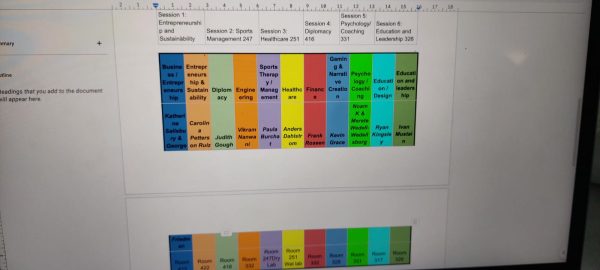Where are they now? (Part 1)
This is the first in a series of articles about our graduates. First up, Mia spoke with Charlie. He passes on some valuable tips to current students.
Charlie G, who achieved an amazing 41 points in his IB exams, and is now studying Mathematics and Philosophy at Edinburgh university.
His best memory of the IB was laughing in History class and the conversations he’d have with friends whilst eating lunch and studying for the IB exams at the library.
His worst moments of the IB is when he got ill with COVID-19, and the stressful time when the EE and IA’s were most important, however with the help of the DP coordinator he managed everything.
His hopes for the future are, from a career point of view, to do something creative, where he can inspire others, and hopes to complete his masters, and PHD.
His advice for the IB students:
“My general advice for the IB would be to have fun with what you are learning! We often tell ourselves that we hate a subject or that we suck at it, but this only reinforces negative opinions that you don’t need to have or that aren’t true. Additionally, we tend to endorse our friends who say similar things, giving ourselves an echo chamber of negativity and self-pity. But I found out later in my second year of DP that I could change my mindset about learning. For example, I began trying to enjoy physics by reminding myself how cool it is to learn about the physical world and universe we are constantly surrounded by but simultaneously unaware of. Perhaps more importantly, I told myself that I was capable of understanding physics but that I was going to need to put in some work to do this. I reminded myself that there would be some bumps and that I might need to return to some problems, but that this was normal and okay. In a nutshell, be open and nice to both yourselves and the subjects you are learning!”
His more specific advice:
1. Really nail your IA’s, seriously. If you do well in your IA’s, it means that you are going to have lower grade boundaries when it comes to your exams, making it easier to achieve your desired grade.
For example, let us say that you need a 75% to get a 7 in one of your subjects and that you have an IA + three papers, all worth 25% each (for simplicity sake). If you got 0% on your IA, you would need to get perfect marks on all of your papers to scratch out a 7; however, if you got 100% on your IA, now you only need 50% from the 75% remaining to get a 7, meaning you would need to roughly score 67% across all three papers.
- READ YOUR IB SUBJECT GUIDES! This is so important for understanding what is expected of you from the exams and your IA’s. Please use these, it also helps distil your learning.
- This one is overused perhaps, but a good reminder is to look at past papers, previous IA’s, and previous EE’s. However, what’s more important is how you use them!
For past papers, don’t think that you can only use them once and that’s it. Because in 2-3 months time, you will have likely forgotten the exact method to solving the questions. Doing the questions 2-3 times over a long period of time with breaks in-between will greatly aid memory recall and understanding. Additionally, make sure you are doing these past papers under TIMED conditions by yourself and without checking the mark scheme until AFTER you are done.
For IA’s and EE’s, I’d recommend to really pay attention to the criteria and subject guide while reading previous examples, and look carefully at the examiner’s comments. Also, don’t look at just top mark examples, look at weaker examples to see what to avoid as well.
- Finally, use your teachers! Don’t be afraid to ask questions and seek advice – they are your teachers for a reason after all!












